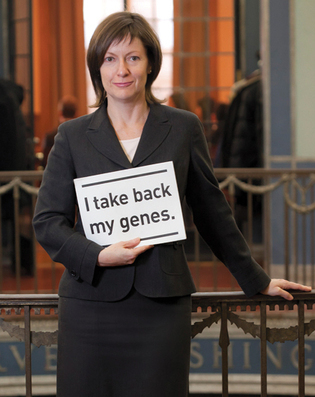By Carole Bass ’83, ’97MSL | 12:25pm June 13 2013

Yale Cancer Center's Ellen Matloff. Photo: Terry Dagradi
A US Supreme Court decision today means "cheaper, faster and better genetic testing" for Yale cancer patients, says Ellen Matloff, director of genetic counseling at the Yale Cancer Center and a plaintiff in the case.
In Association for Molecular Pathology v. Myriad Genetics, Matloff and others raised the question of whether human genes can be patented. The court's unanimous answer: no.
That means that Yale and other health care providers can begin offering their own genetic tests to compete with those sold by Myriad.
Immediately at issue were Myriad's patents on BRCA1 and BRCA2, the genes whose mutations (recently spotlighted by Angelina Jolie) predict high risk of breast and ovarian cancer. Utah-based Myriad claimed exclusive rights to test those genes and, according to Matloff, stopped Yale from offering a less expensive version.
"I'm thrilled," Matloff says by e-mail. "Our patients will have cheaper, faster and better genetic testing moving forward and research will open for BRCA carriers. Thrilled."
Matloff and other plaintiffs contended that genes are naturally occurring and therefore not patentable. Myriad responded that by isolating the DNA, it had created a new product to which it owned legal rights.
“Myriad did not create anything," Justice Clarence Thomas ’74JD concluded in the Supreme Court opinion. "To be sure, it found an important and useful gene, but separating that gene from its surrounding genetic material is not an act of invention."
The court did hold that cDNA, a synthetic version that omits certain portions of the original material, "is distinct from the DNA from which it was derived" and can be patented.
In a press release, Myriad claimed victory. "We believe the court appropriately upheld our claims on cDNA, and underscored the patent eligibility of our method claims, ensuring strong intellectual property protection for our BRACAnalysis test moving forward," says CEO Peter Meldrum. "More than 250,000 patients rely upon our BRACAnalysis test annually, and we remain focused on saving and improving peoples' lives and lowering overall healthcare costs."


